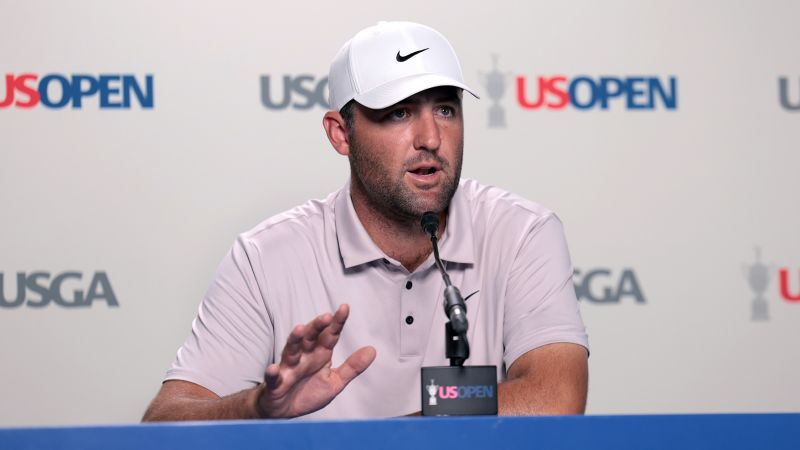Scottie Scheffler, the world’s top-ranked golfer, has revealed a surprising challenge he faces off the course: the pressures and financial entanglements stemming from sports betting. In an era where wagering on athletic performance has become increasingly prevalent, Scheffler admitted that he was compelled to eliminate his Venmo account due to the constant influx of money requests and payments tied to his performance. This revelation surfaces as Scheffler prepares for the US Open at Oakmont Country Club, where he is considered a strong favorite. This article delves into Scheffler’s experience, the implications of widespread sports betting on athletes, and the daunting challenge that Oakmont presents to the world’s best golfers.
Bettor Pressure Forces Scheffler to Close Venmo
The increasing popularity of sports betting has created a unique environment for athletes, one where their performances are not only judged by fans and analysts but also heavily influenced by the financial stakes of bettors. Scottie Scheffler experienced this firsthand, explaining that he often receives messages from fans who have a financial interest in his tournament results. This constant interaction led to an unmanageable situation with his Venmo account.
“That’s why I had to get rid of my Venmo because I was either getting paid by people or people requesting me a bunch of money when I didn’t win,” Scheffler told reporters. “It wasn’t a good feeling.”
While Scheffler acknowledged receiving occasional small payments as a thank you, the overwhelming number of requests made the situation untenable. This highlights a growing concern about the direct impact of sports betting on athletes, blurring the lines between fan engagement and undue pressure.
Scheffler Prepares for Challenging US Open at Oakmont
As Scheffler turns his attention to the US Open at Oakmont Country Club, he faces not only the pressure of being the tournament favorite but also the course’s formidable reputation. Oakmont, hosting the US Open for a record 10th time, is renowned for its challenging layout, featuring fast greens and thick, unforgiving rough. The course demands both precision and power, making it a true test for even the most skilled golfers.
“Starting Thursday morning, we’re at even par and it’s up to me to go out there and play against the golf course and see what I can do,” Scheffler stated, emphasizing the importance of focusing on the game rather than external expectations.
The Daunting Nature of Oakmont Country Club
Oakmont Country Club is notorious for its difficulty, often regarded as one of the toughest courses in the world. The course’s lightning-fast greens and dense rough present a significant challenge, requiring golfers to exhibit exceptional skill and strategic thinking. Accuracy off the tee is crucial, as wayward shots can quickly lead to difficult lies and penalty strokes.
Scheffler himself acknowledged the course’s difficulty, stating, “When you talk about strength and power, I think that becomes more of a factor in these tournaments because, when you hit it into the rough, you’ve got to muscle it out of there.”
Scheffler’s Dominant Form Leading into the US Open
Despite the challenges posed by Oakmont and the distractions of sports betting pressures, Scottie Scheffler enters the US Open in exceptional form. He has secured three wins in his last four appearances, including a major title at the Masters last month. His recent victory at the Memorial Tournament further solidified his dominance, making him the only back-to-back winner of the event alongside Tiger Woods.
After recovering from a freak hand injury sustained while cooking Christmas dinner, Scheffler has demonstrated a remarkable return to form, showcasing his resilience and unwavering focus on the game.
Rising Concerns of Athlete Harassment Due to Sports Betting
The rise of legalized sports betting has brought increased scrutiny and pressure on athletes, with some experiencing harassment and abuse from disgruntled gamblers. This issue has gained attention across various sports, highlighting the need for measures to protect athletes from the negative impacts of betting culture.
Scheffler’s decision to close his Venmo account is a direct consequence of this growing problem, underscoring the fine line between fan engagement and inappropriate behavior. As sports betting continues to expand, it is crucial to address these concerns and ensure a safe and respectful environment for athletes.
Conclusion: Balancing Performance and External Pressures
Scottie Scheffler’s experience with sports betting pressures and his decision to close his Venmo account shed light on the evolving challenges faced by athletes in the modern sports landscape. As he prepares for the US Open at Oakmont, Scheffler remains focused on the game, determined to overcome both the course’s difficulties and the external pressures of being a tournament favorite.
The US Open at Oakmont promises to be a demanding test for all competitors, and Scheffler’s ability to maintain his composure and focus amidst the distractions will be crucial to his success. As the sports betting industry continues to grow, addressing the potential negative impacts on athletes will be essential to preserving the integrity and enjoyment of the game.

Leave a Reply